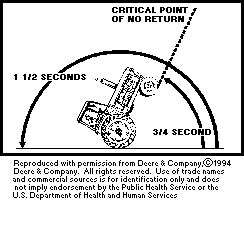

Contact: Fred Blosser (202) 260-8519
January 14, 1997
According to the National Institute for Occupational Safety and Health (NIOSH), farmers and others who use tractors are at risk for severe injury or death if proper hitching methods are not used when towing or pulling objects with tractors.

In a recent article in the Centers for Disease Control and Prevention's Morbidity and Mortality Weekly Report, NIOSH warned that improperly attaching a tow chain to a point above the tractor's drawbar can cause tractors to suddenly flip backward. These rear rollovers often result in injury or death.
On October 29, 1994, a 13-year old male sustained severe fatal head trauma when the 1953-model tractor he was using overturned to the rear while pulling a felled 18 inch diameter tree that was still partially attached at the stump. The tow chain had been hooked directly around the rear axle. The tractor did not have a roll over protective structure (ROPS).
Between April 1991 and June 1996, 28 incidents of sudden rear rollover of tractors were documented in New York by NIOSH's Occupational Health Nurses in Agricultural Communities program. Sixteen of these incidents resulted in death. Improperly hitching equipment or material for towing caused the rollovers in 60% of these incidents. Environmental circumstances such as muddy conditions, wet ground, snow-covered, hilly or uneven terrain may have contributed to some of the incidents.
These figures are particularly tragic because we know that proper hitching and ROPS on tractors would have prevented most, if not all of these injuries and deaths," said NIOSH Director, Dr. Linda Rosenstock. "We must work together to decrease the toll of tractor related incidents on America's farms.
As the number of people using tractors for towing and hauling increases during the winter months, it is important that they are informed of the hazards associated with hitching and the proper prevention measures. NIOSH requests the assistance of the farming community, media, Cooperative Extension Service, equipment manufacturers, and dealers to help deliver this important safety message.
On September 3, 1991, a 71-year old male part-time farmer was fatally injured when his 1950-model tractor overturned to the rear while pulling a downed tree. He suffered multiple trauma with a fractured neck and jaw. The tow chain used to pull the tree had been hitched above the drawbar of the tractor. The tractor was not equipped with ROPS.
On December 3, 1991, a 33-year old male farm worker died as a result of multiple head and trunk injuries when the 1958-model tractor he was using to pull a pickup truck filled with wood overturned to the rear. The tow chain had been hitched high on the back of the tractor. The tractor did not have ROPS.
On January 3, 1994, a 42-year old female farmer died from chest injuries when a 1970-model tractor she was using to pull a loaded pickup truck out of snow overturned to the rear. The tow chain had been attached at the top link connection of the tractor's three point hitch. The tractor did not have a ROPS.
On June 22, 1996, a 29-year old male died from multiple crushing injuries when his 1950-model tractor flipped over, pinning him underneath. The operator of the tractor was clearing trees and brush in the yard of his newly built home. The tow chain was found to be attached to a six inch tree stump, and fastened at the top of the three point hitch attachment.
Don't alter the drawbar by raising or shortening it.
Never attach the load directly to the axle.
Never use a two or three-point hitch as a single-point hitch instead of the drawbar.
If the load attaches by a single point, attach it only to the drawbar.
To obtain a copy of the Morbidity and Mortality Weekly "Fatalities Associated with Improper Hitching to Farm Tractors-New York, 1991-1995" or for more information on tractor rollovers or other occupational safety and health concerns, call:
1-800-356-4674
or visit the NIOSH Homepage at:
http://www.cdc.gov/niosh/homepage.html
